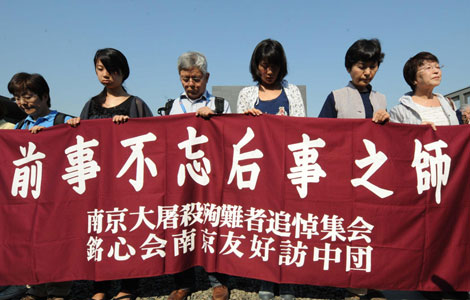

Index rises 5.6% in two minutes; traders and analysts demand probe
Shares in Shanghai had a roller coaster ride on Friday after the country's fifth-largest brokerage by market value reported a trading error.
China Everbright Securities Co said in a filing to the Shanghai Stock Exchange in the afternoon that it encountered a problem in its system during morning trading on the bourse.
Shares surged in the morning, probably triggered by the brokerage trading system fault and led by financial and oil giants, before easing back in the afternoon.
Traders and analysts called for an immediate investigation into possible price manipulation, while short-sellers were furious and urged the authorities to probe the case and come up with a compensation plan.
The Shanghai Composite Index gained 5.6 percent in two minutes in morning trade, with the trading volume rising by 80 percent above the 30-day average.
The index rose by 3.19 percent in the morning to 2,148.39 points, a two-month high, before ending the day at 2,068.45.
The Shanghai exchange said later on its website that trading on the bourse had returned to normal and settlement and clearing for Friday would follow.
Almost all blue chips, including Industrial and Commercial Bank of China, Baosteel, Shanghai Pudong Development Bank, Agricultural Bank of China and Bank of Communications, hit their trading limits within two minutes.
Media reports said the error arose when a trader added two more zeroes to a "buy" order, while other sources said it was because simulated trading was connected to real-time operations.
Jiang Xiangyang, spokesman for the China Securities Regulatory Commission, said after the market closed: "The unusual fluctuation in A-shares was because of a big bunch of stocks being bought in three minutes at around 11 am, and the order was given by the self-owned business department of Everbright Securities Co Ltd.
"The Shanghai Stock Exchange and the Shanghai Securities Regulatory Bureau immediately took measures to investigate the case. So far, there is no result to publish."
The securities company has the responsibility of providing an explanation to the supervisory bodies, Jiang said.
There was speculation that Everbright may have applied for all morning trading to be cancelled. Trading in Everbright shares was suspended in the afternoon.
Sources from the brokerage industry said Everbright Securities invested 7.2 billion yuan ($1.2 billion) into the buying on Friday morning.
Yin Zhongli, deputy director of the Institute of Finance and Banking at the Chinese Academy of Social Sciences, said: "What happened today is far from a simple fault. It is actually caused by supervisors' long-term toleration of price manipulation."
Yang Guoying, a researcher with China Finance Thinktank, said, "I've still got a lot of doubts and questions."
Yang added that a trader would have a quota when buying, and it was strange that such a large sum had flowed onto the market.
Short-sellers saw big losses because of the surprising surge in the morning, as Friday was the date for index futures settlement. Insiders said short-sellers saw their biggest losses on Friday since the trade started in China in 2010. Some said they will sue if there is no compensation plan.
Earlier, there were market rumors that the sudden morning surge in share prices could have been a signal that the securities watchdog may announce a new policy in reopening "T+0", a trading method that has been suspended since 1995 to prevent huge fluctuations.
Jiang, the commission's spokesman, denied this at a news conference, while saying that this system is being studied but is unlikely to be reintroduced in the near term.
Wu Nan, a manager at a quantitative investment fund in Beijing, said another possibility was that the trader made an order, thinking it was on a virtual trading system, when it was on a computer connected to the real exchange market.
"On the trading desk we usually have two computers together. One is for real transactions and the other one is for virtual trade," Wu said.
"But in general there is a firewall between the two computers, and any big purchasing order should be approved by the compliance department.
"The rumors said it was about 7 billion yuan, so this is unbelievable," he added.
Xiao Gang, head of the China Securities Regulatory Commission, wrote in Qiushi magazine this month that much of the agency's efforts in enforcement have been frustrated by the complex web of vested interests.
These are sometimes linked to government officials and senior executives of publicly traded companies, stock-broking firms and financial institutions. Investigators with the commission are faced with a host of problems ranging from detection to evidence-gathering to conviction, Xiao wrote.
China Everbright Group and its Hong Kong-listed unit, China Everbright Ltd, hold 67 percent of Shanghai-based Everbright Securities. The group has businesses ranging from banking, securities, insurance, futures and asset management to hotels, tourism and property development.
Timeline
TRADING FLUKES
? Dec 8, 2005
Broker at Mizuho Securities in Japan, entrusted by client to sell a J-Com Co share at 610,000 yen ($6,260), sells 610,000 shares at 1 yen each, triggering market panic. The Japanese securities company was hit by a loss of 27 billion yen when it decided to buy back the shares.
? Jan 19, 2006
Nasdaq trading system hit by technical failures, with main news websites showing wrong information for more than 1,500 share prices, leading traders to make wrong investment decisions.
? May 6, 2010
US trader types "billion" instead of "million" when selling stocks, sparking a sudden slump in the Dow Jones index, which falls to 9,869.62 from 10,458 in less than 10 minutes, the second-largest daily decline in history.







